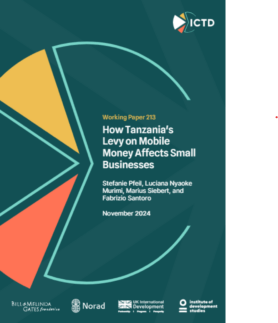Working Paper 213
Mobile money has changed the financial system in many African countries, where it is seen as a convenient alternative to traditional financial services. It is a dominant force in emerging markets, and much of the progress gained in financial inclusion in sub-Saharan Africa is related to the growth of mobile money. Mobile money is used by both the formal and informal sectors. It offers an opportunity for governments to broaden the tax base, and to reach parts of the population that could not previously be reached.
In July 2021, during the COVID-19 pandemic, the Tanzanian Government introduced a new levy on electronic mobile money transactions (e-levy). The e-levy was initially between TSh10 and TSh10,000, and increased the cost of mobile money transfers and withdrawals. It was in addition to the existing 18 per cent value added tax (VAT) and 10 per cent excise duty, and was called a ‘patriotic levy’ to finance development projects. It was followed by public outcry, and concern about setbacks to financial inclusion.
This paper focuses on micro and small enterprises (MSEs) who are members of savings and credit cooperative societies (SACCOS). We look at their knowledge and perceptions of the e-levy, and its impact on their loan repayments from its introduction in July 2021, through subsequent adjustments, and up to its partial withdrawal in July 2023.
The paper is based on the combination of a unique database of loan repayments by 1,571 MSEs in 11 SACCOS, and 601 structured phone interviews with MSEs. The results show that: (1) the amount of MSE loan repayments increased, but the total number of transactions decreased; (2) there is little knowledge about the e-levy; those with more knowledge about the e-levy are more negative about it; (3) the general perception of mobile money is positive; that of the e-levy is negative, due to factors like knowledge, access to information through smartphones, and sector-relevant knowledge.

